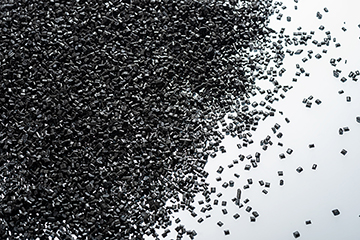 Leonhard Kurz has developed a process for recycling PET waste. This enables carrier films from Kurz transfer finishing processes to be fed back into the material cycle. The recycled material can be used as injection moulding material for high-quality applications.
Leonhard Kurz has developed a process for recycling PET waste. This enables carrier films from Kurz transfer finishing processes to be fed back into the material cycle. The recycled material can be used as injection moulding material for high-quality applications.
In the beginning, Kurz had only one vision: to return the PET residue produced by hot stamping, cold or digital transfer to the reusable materials cycle. This vision has now been overtaken by reality. Because the company has not only succeeded in recycling the residual material, but also in generating a high-quality, injection-mouldable material from it. While recycled plastics are mostly used for simple secondary applications such as sports mats, park benches or flower pots, the PET material developed by Kurz can be used for demanding injection moulding applications.
With an investment volume of several million euros, Kurz worked on the PET recycling concept for more than three years. The breakthrough has now been achieved through the joint efforts of all environmental and process specialists from the graphics and plastics sector at the parent company in Fürth. A new injection moulding material was generated from the PET residue of the Kurz transfer products, which will be available for industrial applications in the future.
Closing the recycling loop
The recycling concept developed by Kurz provides for the collection and delivery or collection of PET residues that have arisen from Kurz transfer products at customers' sites and their conversion into the new injection moulding material in the company's own recycling facilities. A recycling plant in Fürth is currently in pilot operation. Here, short PET residues from Edelmann, a packaging manufacturer with a focus on resource-saving production, are currently being recycled. In a next step, the PET recycling concept is to be made available to other customers. In the medium term, it is planned to successively set up recycling plants at all international production sites in order to ensure consistently sustainable operations through short transport routes. The company also demonstrates consistent sustainability in the energy used for the Fürth recycling plant: as for all production sites in Germany, the recycling plant also uses one hundred percent electricity from renewable sources.
"As the world market and innovation leader in the printing sector, we see it as our responsibility to offer the printing and plastics industry sustainable ways to achieve excellent finishing and decoration. For many years we have been making every effort to ensure that our transfer products are produced, processed and disposed of in a sustainable manner. With our new recycling process we have now completely closed the cycle of recyclable materials. This is a milestone in plastics recycling," explains Markus Hoffmann, Member of the Management Board at Kurz.



































































































